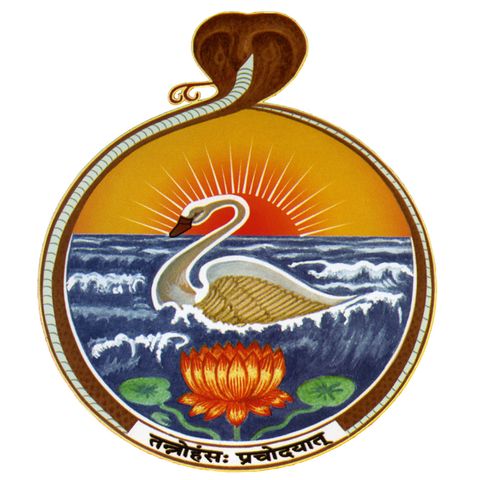The Dhammapada: Buddha's Message to the World | Swami Tattwamayananda

Jun 13, 2019 ·
1h 8m 58s
Lecture given on June 9, 2019 at the Vedanta Society of Northern California by Swami Tattwamayananda. -An overview of Dhammapada is provided. Few verses are discussed in depth from Yamaka-vaggo...
show more
Lecture given on June 9, 2019 at the Vedanta Society of Northern California by Swami Tattwamayananda.
-An overview of Dhammapada is provided. Few verses are discussed in depth from Yamaka-vaggo and Brahmana-vaggo.
-Dhammapada: most popular and condensed summary of Buddha's teachings. Profound for any spiritual seeker & not tied to a religion. Captures Buddha's responses to questions from disciples. Each verse is accompanied by a story.
-Buddhism is popular because it is simple, straightforward, psychological and not tied to any dogmas. Dhammapada provides a taste of spiritual freedom (Vimukti). How to achieve liberation of the mind from all bondage and suffering.
-Four noble truths: Suffering, cause of suffering, the way out is Nirvana, achieved by eight-fold disciplines.
-Eight fold disciplines are: Right speech, right action, right livelihood, right effort, right mindfulness, right concentration, right view and right resolve.
-Buddha's concept of Dukkha is explained: discontent in the midst of luxuries qualifies one for the quest for freedom. It is a desire for something higher.
-Buddha's own story and quest for freedom is discussed.
-1st verse of Yamaka-Vaggo is discussed in depth. "Mind is what matters. Mind precedes all actions". Story of Buddhist monk is discussed who loses his vision, walks over termites, and yet is non-attached to the killing of termites due to purity of his mind.
-Adjoining verse of the 1st verse is discussed: "If mind is pure, happiness follows". Story of a miserly person is discussed, whose son reaches celestial abode upon seeing Buddha and feels tranquility while dying.
-422nd verse of Brahmana-Vaggo is discussed: "Who has realized the supreme truth, who has conquered death, who has realized his real nature, and who is devoid of any wrong thoughts - Him I call Brahmana". Similarities with the 18 verses of the second chapter of the Bhagavad Gita on the Sthitaprajna are discussed. Reinforced with the story of Angulimala, who achieves Nirvana upon meeting Buddha.
-Last verse (423) of Brahmana-vaggo is briefly discussed: "Has the capacity to transcend his past impressions and samskaras and attain Nirvana - Him I call Brahmana". The concept of being a Brahmin has nothing to with the social institution of caste in this context.
show less
-An overview of Dhammapada is provided. Few verses are discussed in depth from Yamaka-vaggo and Brahmana-vaggo.
-Dhammapada: most popular and condensed summary of Buddha's teachings. Profound for any spiritual seeker & not tied to a religion. Captures Buddha's responses to questions from disciples. Each verse is accompanied by a story.
-Buddhism is popular because it is simple, straightforward, psychological and not tied to any dogmas. Dhammapada provides a taste of spiritual freedom (Vimukti). How to achieve liberation of the mind from all bondage and suffering.
-Four noble truths: Suffering, cause of suffering, the way out is Nirvana, achieved by eight-fold disciplines.
-Eight fold disciplines are: Right speech, right action, right livelihood, right effort, right mindfulness, right concentration, right view and right resolve.
-Buddha's concept of Dukkha is explained: discontent in the midst of luxuries qualifies one for the quest for freedom. It is a desire for something higher.
-Buddha's own story and quest for freedom is discussed.
-1st verse of Yamaka-Vaggo is discussed in depth. "Mind is what matters. Mind precedes all actions". Story of Buddhist monk is discussed who loses his vision, walks over termites, and yet is non-attached to the killing of termites due to purity of his mind.
-Adjoining verse of the 1st verse is discussed: "If mind is pure, happiness follows". Story of a miserly person is discussed, whose son reaches celestial abode upon seeing Buddha and feels tranquility while dying.
-422nd verse of Brahmana-Vaggo is discussed: "Who has realized the supreme truth, who has conquered death, who has realized his real nature, and who is devoid of any wrong thoughts - Him I call Brahmana". Similarities with the 18 verses of the second chapter of the Bhagavad Gita on the Sthitaprajna are discussed. Reinforced with the story of Angulimala, who achieves Nirvana upon meeting Buddha.
-Last verse (423) of Brahmana-vaggo is briefly discussed: "Has the capacity to transcend his past impressions and samskaras and attain Nirvana - Him I call Brahmana". The concept of being a Brahmin has nothing to with the social institution of caste in this context.
Information
| Author | Vedanta Society, San Francisco |
| Website | - |
| Tags |
Copyright 2024 - Spreaker Inc. an iHeartMedia Company
